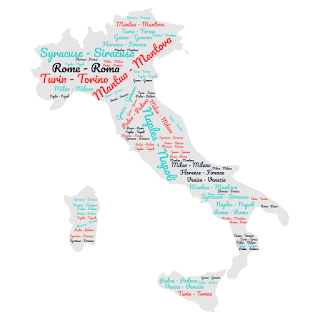The Question
It’s something we’ve thought about before but from the opposite perspective. Specifically, in the post Foreign City Names in Italian – Why They Are Sometimes in English why discussed why names of some cities outside of Italy are spelled differently in Italian than their original name. For example, why London is written in Italian as "Londra".
In this post, we deal with English language names of Italian cities that are different from how the city is referred to in the Italian language. For example, in English we say “Genoa” and Italians say “Genova”.
Explanation
The answer to our friend’s sister’s question took us on a treasure hunt. First some terminology from the UNSD — United Nations Group of Experts on Geographical Names:
- Endonym: "Name of a geographical feature in an official or well-established language occurring in that area where the feature is located."
- Exonym: "Name used in a specific language for a geographical feature situated outside the area where that language is spoken, and differing in its form from the name used in an official or well-established language of that area where the geographical feature is located."
There is no hard and fast rule governing why English doesn’t use the name of an Italian city as used in the Italian language. However, there are a few categories to help us make sense of it. The English name could:
- derive from different root words for historical reasons. Examples: Germany in English, Allemagne in French, and Deutschland in Germany.
- be a cognate and diverges in pronunciation or orthography. Examples: Italy in English and Italia in Italian, Sicily in English and Sicilia in Italian, Brazil in English and Brasil in Portuguese.
- be translated from the native language. Examples: Netherlands in English and Nederland in Dutch.
- be a native or borrowed word. A substantial proportion of English-language exonyms for places in continental Europe are borrowed (or adapted) from French. For example, Florence comes from French, which spells it the same. The same for Naples and Rome.
Lists
Italian city names that are spelled and pronounced differently in English than they are in Italian:
- (English) => (Italian)
- Rome => Roma
- Florence => Firenze
- Venice => Venezia
- Milan => Milano
- Padua => Padova
- Genoa => Genova
- Mantua => Mantova
- Naples => Napoli
- Turin => Torino
- Syracuse => Siracusa
Italian region names that are spelled and pronounced differently in English than they are in Italian:
- (English) => (Italian)
- Piedmont => Piemonte
- Lombardy => Lombardia
- Sardinia => Sardegna
- Tuscany => Toscana
- Sicily => Sicilia
- Apulia => Puglia
Italy places names that don’t change spelling in English:
- Cities: Cortona, Bergamo, Arezzo, Palermo, Perugia, Bolzano, Brescia, Verona
- Regions: Abruzzo, Basilicata, Calabria, Campania, Emilia-Romagna, Lazio, Liguria, Marche, Molise, Umbria, Veneto
References
English exonyms - Wikipedia

Thanks, interesting list. One note: you write "derive from different root words [...] Spain in English and España in Spanish". This is a bad example, because in fact both derive from the same root, Latin Hispaniae. It's common in Latin-derived words for Spanish to retain the initial "es" while English drops the "e". (In such cases, French often drops the "s", but not in this case.)
ReplyDeleteThank you for pointing it out. Will work on correcting that.
ReplyDelete